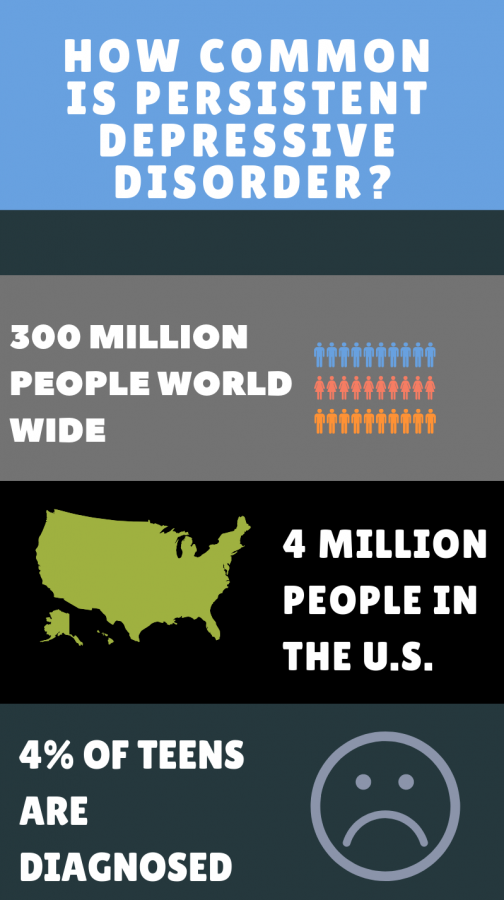Personal column: How I have dealt with dysthymia
*Sources: Children’s Hospital of Wisconsin and American Academy of Family Physicians
February 28, 2019
Many nights, I’d sit upright in my bed just staring at the clock with a vacant gaze, watching the minutes tick by one after another.
Two years ago, I was diagnosed with Persistent Depressive Disorder, better known as dysthymia, which is chronic mild depression. Dysthymia is a special kind of depression. I do occasionally experience periods of overwhelming sadness, but generally when I’m having a dysthymic moment, I feel a vast wave of emptiness that leads to me feeling like a hollow shell. Dealing with this on top of ADHD, ADD and anxiety makes for an interesting life to say the least.
I refer to dysthymia lovingly as the “silent bummer” because many people are not aware they have it, especially in mild cases. It’s not dangerous, yet it makes life difficult at times and it’s hard to tell if it’s even happening. It will sneak up on me, and I’ll have a hard time figuring out exactly what’s going on until it’s too late for me to have a chance to take any precaution against it.
For before my diagnosis I thought I was being an overdramatic privileged boy who was taking life for granted. God forbid I become one of those kids accused of “pretending just to get attention,” so I just sat quietly and felt guilty. It took me a while to realize that living a life filled with blessings doesn’t mean I can’t be susceptible to depression.
It is an interesting position to be in, understanding my privilege and still being depressed. I have seen many who have faced hardship in different ways, and one thing I have learned is that suffering does not discriminate. Rich or poor, white or black, man or woman, it hits all of us in different ways.
I’m not a very religious person, so I never had a God to turn to. I had my parents who I love very much and respect, but I never thought my dad would understand and my mom was busy taking care of my sister who has Lyme disease. I didn’t want to create any unnecessary stress for anyone. I’ve always had my friends, but as much as I love and appreciate all the support they have given me, I know that they can only do so much.
Thinking back on the last few years, I spent a majority of my time being miserable. Even in moments when great things were happening, I would feel hollow. Then, once I regained feeling, I would be overwhelmed with the sadness and fear of realizing the trance in which I was trapped. I did eventually start therapy which has helped me tremendously, but the dysthymia tests me to this day. I feel it lurking like a devil on my shoulder, but many things have helped me get to the happier and healthier place I am in now.
I decided I wanted to help others as much as possible. I have met many people that share in my struggles, and I have met others who struggle with far more terrifying demons. Friends and family have told me I have a way with people and understanding them. I began to use helping others as a crutch, relying on it to make myself feel better. This would more often than not lead to me being let down or hurt by others. Seeing people feel better because of what I did for them helped me, but I often bit off more than I could chew. Some of their demons would weigh heavily on me and haunt my own dreams.
What has really taught me more than anything is experience. I have learned so much through my own struggles with dysthymia, anger, anxiety and frustration. I have seen so many go through their own problems and supported them in times in need. Over time, I began to make the most important realization of my life: the only thing that can make me feel at peace is myself. I have gotten a lot of care from many people, and I have appreciated every bit of it, but ultimately, it’s up to me to shape my own mind and view of the world.
Much of what has helped me learn to accept and live with dysthymia has been studying different philosophies. As mentioned earlier I have never been religious and it made it hard finding direction or purpose in anything. Everyone goes through a time where we question if all of this is worth struggling through and why is it worth it? I learned a great deal about existential nihilism from many philosophers like Albert Camus and Jean Paul Sartre. Some teachers even assign their students to read Sartre’s work, and all of it really helped me discover the importance of individuality and creating our own purpose. There is not one correct answer to these daunting questions that can intimidate us, but I have found it very important to discover my beliefs and staying true to my moral standards.
Mental illness can test limits. It pushes you into places you never want to be and takes a tremendous amount of perseverance and strength to overcome. You will never find a better friend than yourself, or a worse enemy. Dealing with struggles strengthens us, and it’s important to remember the power you have within yourself and the importance in each and every one of us.


